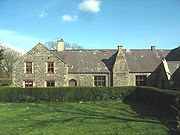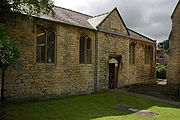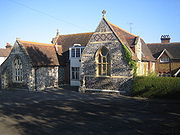
National school (England and Wales)
Encyclopedia

England
England is a country that is part of the United Kingdom. It shares land borders with Scotland to the north and Wales to the west; the Irish Sea is to the north west, the Celtic Sea to the south west, with the North Sea to the east and the English Channel to the south separating it from continental...
and Wales
Wales
Wales is a country that is part of the United Kingdom and the island of Great Britain, bordered by England to its east and the Atlantic Ocean and Irish Sea to its west. It has a population of three million, and a total area of 20,779 km²...
by the National Society for Promoting Religious Education
National Society for Promoting Religious Education
The National Society for Promoting Religious Education, often just referred to as the National Society, is a Church of England body in England and Wales for the promotion of church schools and Christian education....
.
These schools provided elementary education, in accordance with the teaching of the Church of England
Church of England
The Church of England is the officially established Christian church in England and the Mother Church of the worldwide Anglican Communion. The church considers itself within the tradition of Western Christianity and dates its formal establishment principally to the mission to England by St...
, to the children of the poor.
Together with the less numerous British Schools of the British and Foreign School Society
British and Foreign School Society
The British and Foreign School Society offers charitable aid to educational projects in the UK and around the world by funding schools, other charities and educational bodies...
, they provided the first near-universal system of elementary education in England and Wales.
The schools were eventually absorbed into the state system, either as fully state-run schools or as faith school
Faith school
A faith school is a British school teaching a general curriculum but with a particular religious character or has formal links with a religious organisation. It is distinct from an institution mainly or wholly teaching religion and related subjects...
s funded by the state.
History

In 1808 the Royal Lancastrian Society (later the British and Foreign School Society) was created to promote schools using the Monitorial System of Joseph Lancaster
Joseph Lancaster
Joseph Lancaster was an English Quaker and public education innovator.-Life:Lancaster was born the son of a shopkeeper in Southwark, south London....
.
The National Society was set up in 1811 to establish similar schools using the system of Dr Andrew Bell, but based on the teachings of the Church of England in contrast to the non-denominational Christian instruction of the Lancastrian schools.
The aim of the National Society was to establish a national school in every parish of England and Wales.
The schools were usually adjacent to the parish church, and named after it.
From 1833, the state began to pay annual grants to the societies, with the much larger National Society receiving a proportionally larger share.
The grants increased over time, but they were accompanied by inspections and increasing demands from the state.
The rigid monitorial system, though economical, came to be viewed by inspectors as limited.

The National Society responded by raising £10 million and almost doubling the number of its schools to 12,000 in 15 years.
However the schools found it difficult to meet their maintenance costs, and also suffered from competition with board schools.
Many schools were closed or handed over to the school boards.
The Education Act 1902
Education Act 1902
The Education Act 1902 , also known as Balfour's Act, is an Act of the Parliament of the United Kingdom affecting education in England and Wales. At the time of passage of the Act, the Conservative Party was in power...
provided some relief.
During the 20th century these schools became voluntary aided
Voluntary aided school
A voluntary aided school is a state-funded school in England and Wales in which a foundation or trust owns the school buildings, contributes to building costs and has a substantial influence in the running of the school...
or voluntary controlled
Voluntary controlled school
A voluntary controlled school is a state-funded school in England, Wales and Northern Ireland in which a foundation or trust has some formal influence in the running of the school...
primary schools, funded by the state but still able to promote the teachings of the Church of England.

